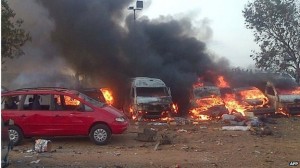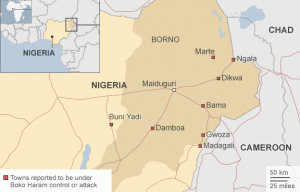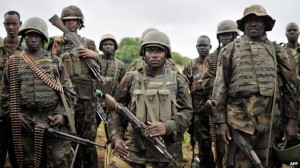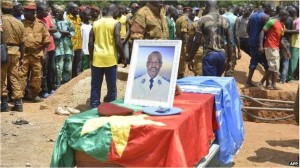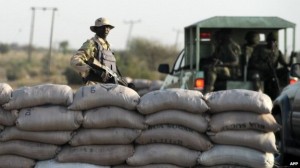
Nigerian troops battling to defeat Militant groups http://www.bbc.com/news/world-africa-29021037 2 September 2014 Last updated at 08:15 ET
2 September 2014 Last updated at 08:15 ET
One of the many issues plaguing the country Nigeria in West Africa has been relentless attacks and occupation by Islamic militants. On September second 2014, BBC News reported that the Nigerian Military has lost control of a town called Bama the second largest town in Borno State. The group responsible for this takeover is a militant Islamic group called Boko Harem. BBC reports that Bama is a key north-eastern state in Nigeria. This takeover was a result of aggressive combat with government forces. Residents told BBC Hausa reporters that initially Boko Haram attacks were “repelled” by the military. However, the Islamic militants returned with reinforcements to seize the town. The militants began by taking over military barracks, which lead soldiers and residents to flee on foot. Many who fled sought refuge by foot in Maiduguri a town within the capital of Nigeria called Abuja.
The takeover of the town Bama by the Boko Haram Islamic militant group is a very crucial issue. The capture of the town Bama places Boko Haram closer to it next target, Maiduguri. As previously stated, Maiduguri is the capital of Nigeria. If the Islamic militants gain control of Maiduguri they will soon be able to control the capitol which will leave Nigeria in a delicate state. According to BBC, the leader of Boko Harem Abubakar Shekau has announced a caliphate in areas controlled by Boko Harem. It is possible that Nigeria could become populated with many Islamic states ruled by Islamic militants.
As I read the reports by BBC, it was difficult to gauge the author’s point of view of this situation. Throughout the article it was clear that the author worked hard to seem unbiased and to give direct news without interjections of his/her thoughts. However, I noticed a different tone as I continued to read around the article which had quotes in bold with opinions of others about the Boko Harem militant takeover. A man called Mannir Dan Ali was quoted saying, “Just when you imagine that it cannot get worse for the Nigerian military and its pride as a fighting force, it takes a further dive.” This quote seemed to take a hit at the Nigerian Military without the author using his/her own voice to interject his/her opinion of the situation. The author hit on the stereotypical topics discussed in class about reporters concentrating on the corruption, military instability, and lack of leadership in African nations. When the writer of this article put quotes about “Nigerian Military pride as a fighting force” he/she diverged into a stereotyping territory. The writer seems to look down on the Nigerian leaders and their lack of control of Islamic militants.
Throughout my entry I have stated that the source of the article I read was BBC News. I truly believe that BBC does impact the choice of words that are used in this article. For the most part, the article is very informative and not as biased as many other articles. However, there are instances of biased views in the margins with quotes directly from opposing sides of this situation. The voice of the quotes seems to be that of someone looking down on Nigeria and judging its military strength. Personally I agree with the biased tone of this article. Nigeria needs to strengthen its military might and fight against Islamic militants that are terrorizing the country and its innocent people. Thought my blog I believe that my biased tone is evident because I strongly believe that Nigerian leaders are slowly losing their grip over Islamic terrorist.

